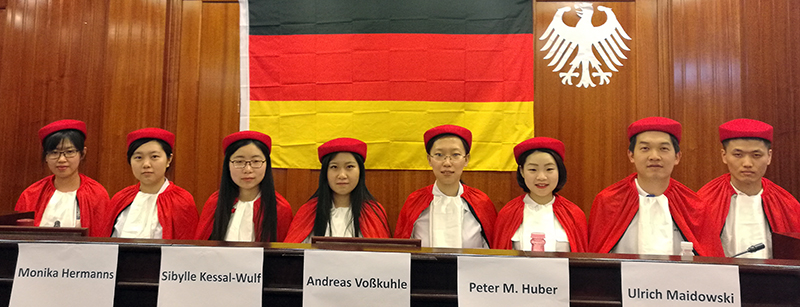Germany’s supreme constitutional court (“Bundesverfassungsgericht”) has rejected a proposed ban on the far-right “Germany’s National Democratic Party” (NPD) accused of neo-Nazi links because its members are deemed too ineffective to pose a real threat to democracy. On 17 January 2017, the court’s second senate agreed on this judgment unanimously. This verdict resembles the judgement of China-EU School of Law (CESL)students who heard this case in a Moot Court.
Under the guidance of the lecturers of the Constitution and Constitutional Litigation course, Prof. Zheng Yongliu and Dr Yu Fei, more than 20 students had started to pay close attention to the case.Within just two months of preparation, students studied the case in detail and translated a large number of foreign materials. As expected, a traditional German constitutional court trial was successfully transplanted into the Chinese classroom. Finally, eight student judges voted in the ratio of 5 to 3 not to dissolve the NPD.

"It is gratifying that our students’ judgment, the conclusion as well as the part of the argument reasoning, are in line with the German court's ruling,” professors said. The analysis at CESL focused mainly on three aspects: First, how to define “seek” in Article 21 of German Basic Law; secondly,how to define the aims of the party or the behavior of its adherents; thirdly, how to measure the possible implementation of what is sought for. The students’outstanding performance deeply impressed other students and lecturers.
In the 2017 judgement, the court argued that although the NPD pursues aims that are unconstitutional, there was a lack of evidence that the party would successfully achieve its goals.The NPD disrespects human dignity and is incompatible with the principles of democracy, the judges argued. Furthermore, the party aims at abolishing the existing free democratic basic order, and intends to replace it with an authoritarian national state of an ethnically defined people.
However, as in Germany, the NPD meets little general approval, the party neither has a prospect of obtaining majorities in elections nor the option of taking part in coalitions, the court ruled. In the more than fifty years of its existence, the NPD has never been successful in being represented in a Land parliament on a permanent basis. Furthermore, the other parties represented in the federal and Land parliaments have so far not been willing to enter into coalitions with the NPD or even to occasionally cooperate with it. It currently has only one representative in the European Parliament. The party’s results in elections to the European Parliament are stagnating at a low level. There are no indications suggesting that this situation will change in the future. The NPD’s low degree of organization shows a downward trend. Its total number of less than 6,000 members considerably limits the NPD’s possibilities of action.
Moreover, the intimidating or criminal behavior of members or adherents, as well as the building up of potentials for violence, can be dealt with by means of police law and criminal law. Finally, the judges ruled: “No Prohibition of the National Democratic Party of Germany as there are no indications that it will succeed in achieving its anti-constitutional aims.”
The strict German law that allows banning unconstitutional parties represents lessons learnt from the Weimar Republic when the Nazi party abolished the free democratic order within the framework of the political system. Under Article 21 of German Basic Law it is written that “Parties that, by reason of their aims or the behavior of their adherents, seek to undermine or abolish the free democratic basic order or to endanger the existence of the Federal Republic of Germany shall be unconstitutional. The Federal Constitutional Court shall rule on the question of unconstitutionality.” The prohibition of a political party thus requires that the party seeks to actively undermine or abolish the free democratic basic order. It is not a means for prohibiting views or an ideology.
Only two parties have been banned since the Second World War – the Socialist Reich party, a successor to Hitler’s Nazi party, in 1952, and the far-left “German Communist Party” (KPD) in 1956. In2003, a first attempt to dissolve the NPD collapsed as several government-paid informants within the NPD were partially responsible for evidence against the party.
Text by Dr Yu Fei
English translation by Lu Qing, Double master student from 2015 intake

